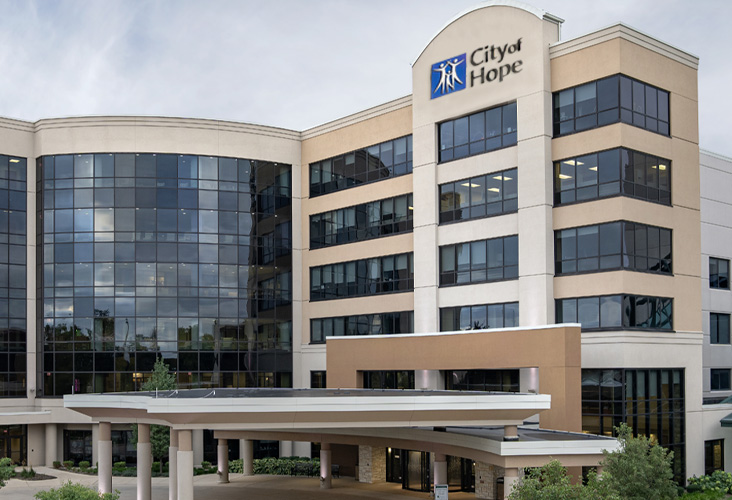
We use a core set of cookies to make our website work. We also use optional cookies to measure our site's performance, personalize content and provide social media features, including through our advertising and analytics partners. For the optional cookies, you can "Accept All" or "Reject All."
By using our site, you agree to our Terms of Use and Privacy Policy.

The interventional oncology program at City of Hope Chicago uses targeted, minimally invasive procedures, performed with the help of imaging guidance, to diagnose, treat and/or relieve the symptoms of cancer. The goal is to improve patients’ quality of life by reducing or eliminating the need for invasive surgery.
The rapidly growing field of interventional oncology has become a pillar of cancer care, along with medical, surgical and radiation oncology. Cancer patients are referred to interventional oncologists to integrate minimally invasive treatments, when possible, with the goal of reducing the need for invasive surgeries. Interventional oncologists may also perform diagnostic procedures, such as colonoscopies or endoscopies.
Each of the specialists in our interventional radiology program collaborates regularly with the other doctors and clinicians on the patient’s care team, monitoring the patient’s progress, making adjustments to the treatment plan when necessary and helping the patient manage side effects and support quality of life in keeping with our supportive care model.
The interventional oncology program at City of Hope Chicago includes the following disciplines:
The interventional radiology program at City of Hope Chicago is designed to provide cancer patients with minimally invasive options for some treatments. Several interventional radiology procedures may be used as an alternative to traditional surgery. Other interventional radiology procedures may be used to manage pain and complications, conduct biopsies and alleviate a variety of symptoms that may result from cancer treatment.
The interventional radiologists at City of Hope Chicago are educated and trained in diagnosing and treating diseases using minimally invasive techniques. These specialists also perform procedures to support patient comfort. For example, they may use drainage catheters to drain excess fluid and relieve symptoms that may cause pain or discomfort, or insert ports and PICC lines to reduce the number of needle pricks required during treatment. Bone and joint injections may be used for pain management.
Learn more about interventional radiology at City of Hope
City of Hope Chicago recognizes that lung cancer is complex. That’s why our interventional pulmonology department is designed to offer minimally invasive treatment options to cancer patients and those experiencing respiratory disease or infection.
The interventional pulmonologists at City of Hope Chicago specialize in diagnosing and treating diseases of the lungs and respiratory system, such as pneumonia, bronchitis, emphysema, asthma and cancer. Using minimally invasive techniques, these specialists perform interventional procedures in the airways and chest cavity, including advanced bronchoscopic and pleuroscopic techniques.
During cancer treatment, some patients may experience pleural effusion or obstruction of the airway, causing symptoms such as wheezing, respiratory failure and uncontrolled cough. These symptoms may not only impact the patient’s quality of life, they may also delay or interrupt treatments. Our interventional pulmonologists use imaging technology to look for the cause of these and other symptoms. Then, using minimally invasive pulmonology techniques and procedures, they may remove obstructions in the airway or fluid around the lungs, and reduce symptoms that cause discomfort to help the patient breathe more comfortably.
Learn more about interventional pulmonology at City of Hope
The interventional gastroenterology department at City of Hope Chicago offers advanced diagnostics and treatments for a wide range of digestive system cancers, including colorectal, pancreatic, esophageal, stomach and liver cancer. Our gastroenterologists may also help treat lung or breast cancers that have metastasized or spread to the gastrointestinal system. The team is led by experts who diagnose, stage and treat gastrointestinal cancers, as well as precancerous conditions such as Barrett’s esophagus, a risk factor for esophageal cancer.
Learn more about the gastroenterology program at City of Hope Chicago
Learn more about the Barrett's esophagus program at City of Hope Chicago
The quality-of-life issues a cancer patient faces are often complex. After surgeries and other treatments, many patients experience pain, one of the most common cancer-related side effects. At City of Hope Chicago, a team of pain management physicians is dedicated to helping patients address these and other relevant needs.
Pain management physicians lead the efforts to treat cancer-related pain, in consultation with your oncology team, to help improve your quality of life. Our Chicago pain management doctors work closely with patients to tailor treatment options to meet the needs of each individual, using implanted pain pumps, nerve block therapies and prescription medications when appropriate. These physicians work closely with your care team to combine pain management with other supportive care services, including nutrition therapy, oncology rehabilitation and group or individual psychotherapy counseling. Our pain management practitioners conduct twice-weekly comfort rounds, visiting patients admitted for treatment. These visits allow our pain management physicians to gauge each patient’s pain level and make modifications to the treatment plan as needed.
Learn more about pain management at City of Hope
